Healthcare Teams from Across the Nation Flock to NYC to Care for COVID-19 Patients
Hundreds of doctors, nurses, and other medical workers have stepped up to support front-line staff at NewYork-Presbyterian.
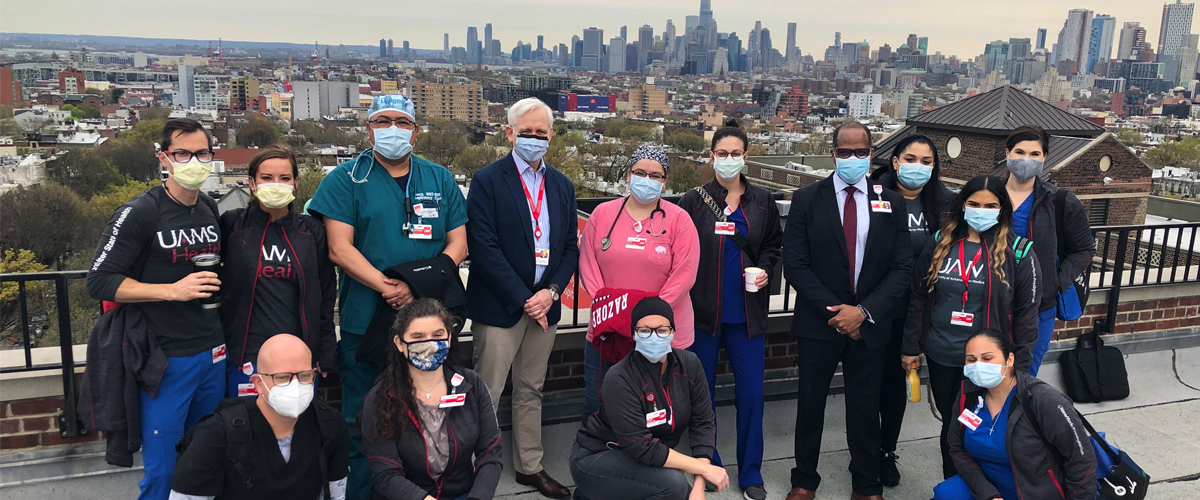
The team from UAMS in Arkansas on the roof of NewYork-Presbyterian Brooklyn Methodist Hospital with hospital leaders.

The team from UAMS in Arkansas on the roof of NewYork-Presbyterian Brooklyn Methodist Hospital with hospital leaders.
Dr. Tomas Diaz was born at NewYork-Presbyterian/Columbia University Irving Medical Center, just a short distance from his first childhood home in the Washington Heights neighborhood.
So when his San Francisco hospital put out the call for volunteers to help NewYork-Presbyterian care for patients during the COVID-19 crisis, the emergency medicine physician jumped at the chance.
“This is my community,” says Dr. Diaz, who attended Columbia University as an undergraduate student and has close family in Washington Heights, Brooklyn, Queens, and New Jersey, including his two 88-year-old grandmothers. “I had a lot of anxiety being on the West Coast while my family and friends were here. So in coming back to New York, it does feel like a bit of a relief to be closer to home and to be caring for the community where I grew up.”
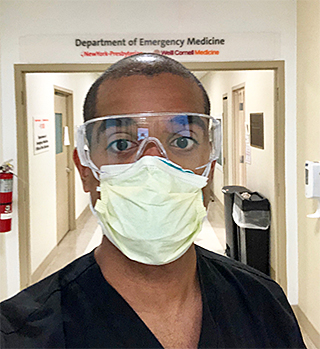
Dr. Tomas Diaz from UCSF in San Francisco in the emergency department at NewYork-Presbyterian/Weill Cornell Medical Center.
Dr. Diaz is one of 25 doctors and nurses from the University of California, San Francisco (UCSF) Medical Center who arrived at NewYork-Presbyterian in April to help care for patients until May 9. The team was selected from more than 200 medical workers at UCSF who volunteered for the assignment.
These physicians and nurses are among the hundreds of healthcare workers from hospitals and medical centers across the country providing urgently needed healthcare support in the city that is the epicenter of the coronavirus outbreak. They have been treating patients across NewYork-Presbyterian campuses.
“To see these healthcare teams from across the country bring their expertise, energy, and commitment to our patients and colleagues in the midst of this pandemic is inspirational,” says Shaun Smith, senior vice president and chief people officer at NewYork-Presbyterian. “We are grateful for their invaluable help as we take on one of the world’s greatest challenges together. Our colleagues leaned forward and asked, ‘How can we help?’ This truly signifies the collaboration of our peers across the country who have worked side by side with our teams — and just in time when we needed them most!”
Among them are Cleveland Clinic, which sent more than two dozen nurses and physicians, and Cayuga Health in Ithaca, New York, sent two buses of medical workers. About 50 doctors, nurses, and other staff traveled over 2,100 miles from Intermountain Healthcare in Utah. Sixteen nurses and seven respiratory therapists arrived April 18 from the University of Arkansas for Medical Sciences (UAMS) and Arkansas Children’s Hospital for three to four weeks. In addition, nearly 200 military medical and support veterans from all parts of the country and branches of service have been treating patients with COVID-19 at two NewYork-Presbyterian field hospitals in northern Manhattan.
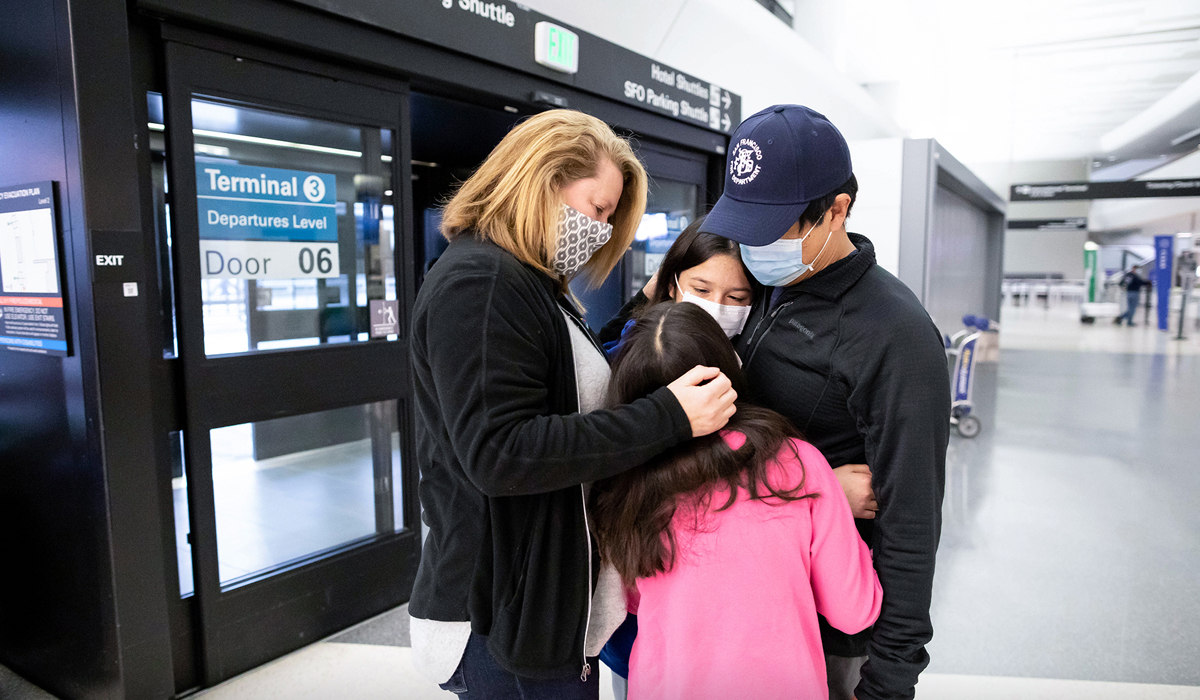
Dr. Clement Yeh of UCSF says goodbye to his wife and daughters in San Francisco as he heads to NewYork-Presbyterian.
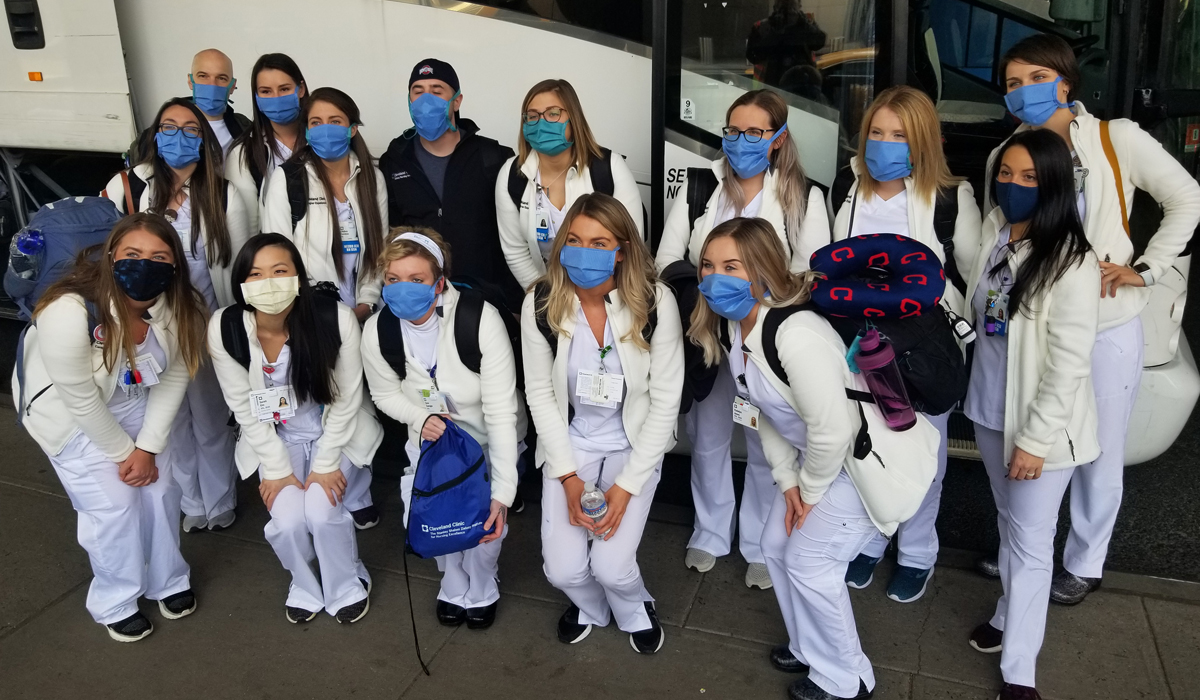
The Cleveland Clinic team on their way to NewYork-Presbyterian.
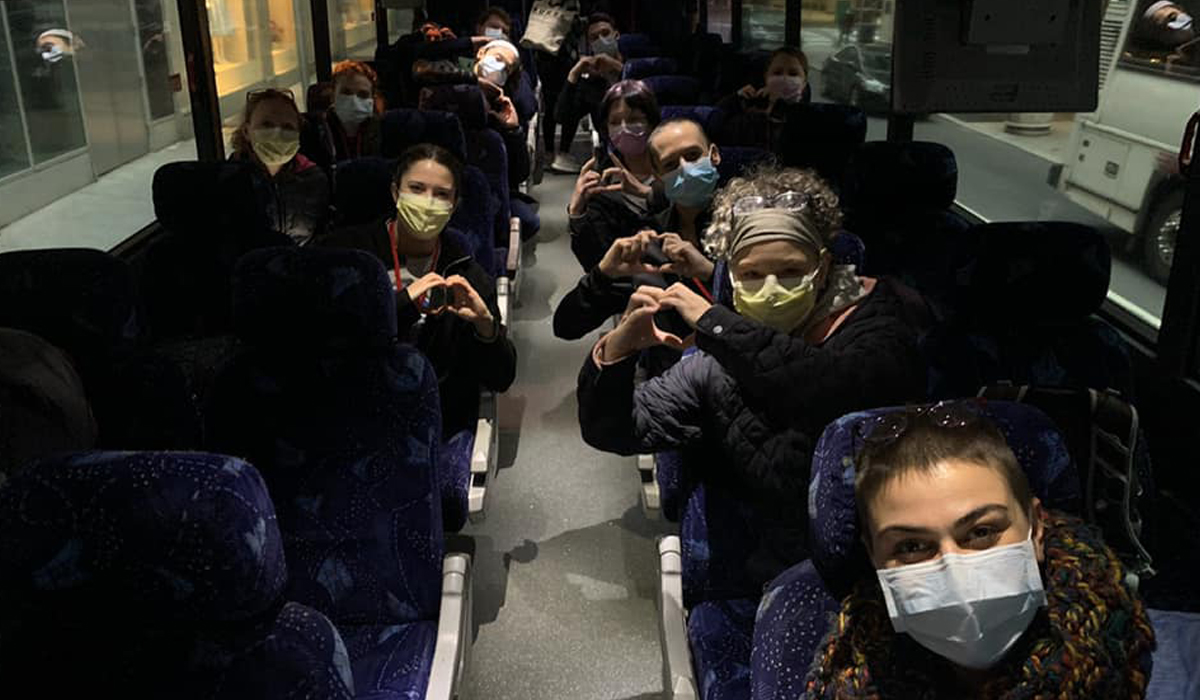
Medical workers from Cayuga Health on the bus from Ithaca, N.Y. to NewYork-Presbyterian/Weill Cornell Medical Center.
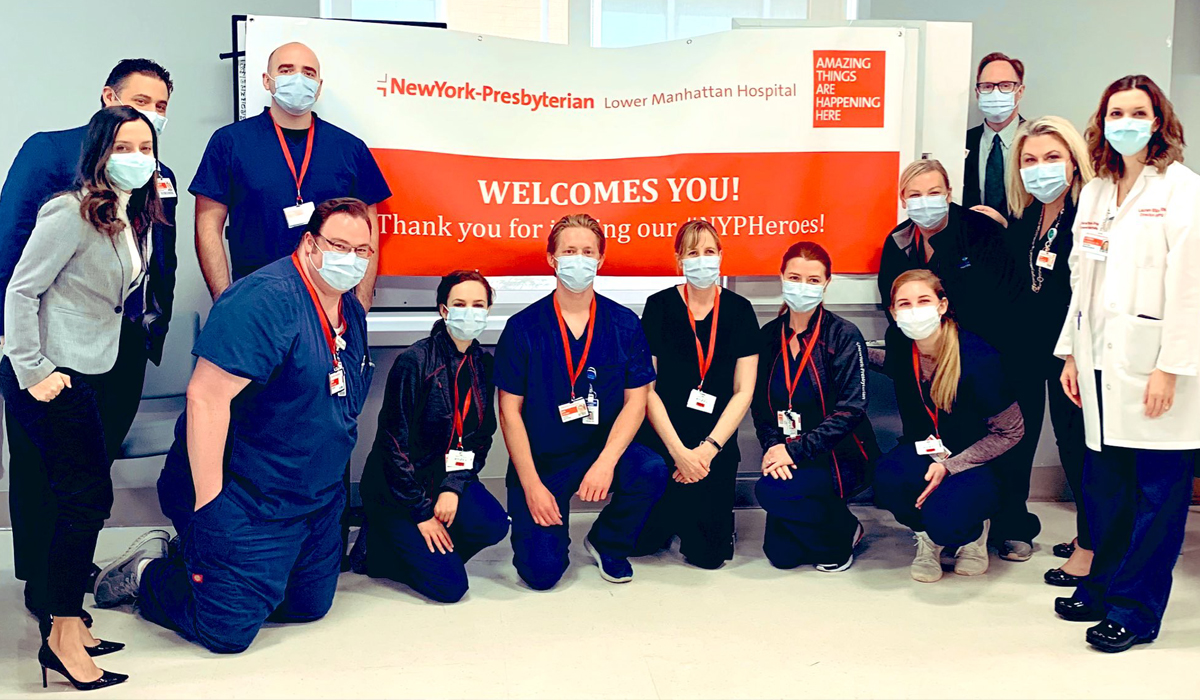
Some of the Intermountain Healthcare medical workers, welcomed at NewYork-Presbyterian Lower Manhattan Hospital, who traveled over 2,100 miles from Utah.
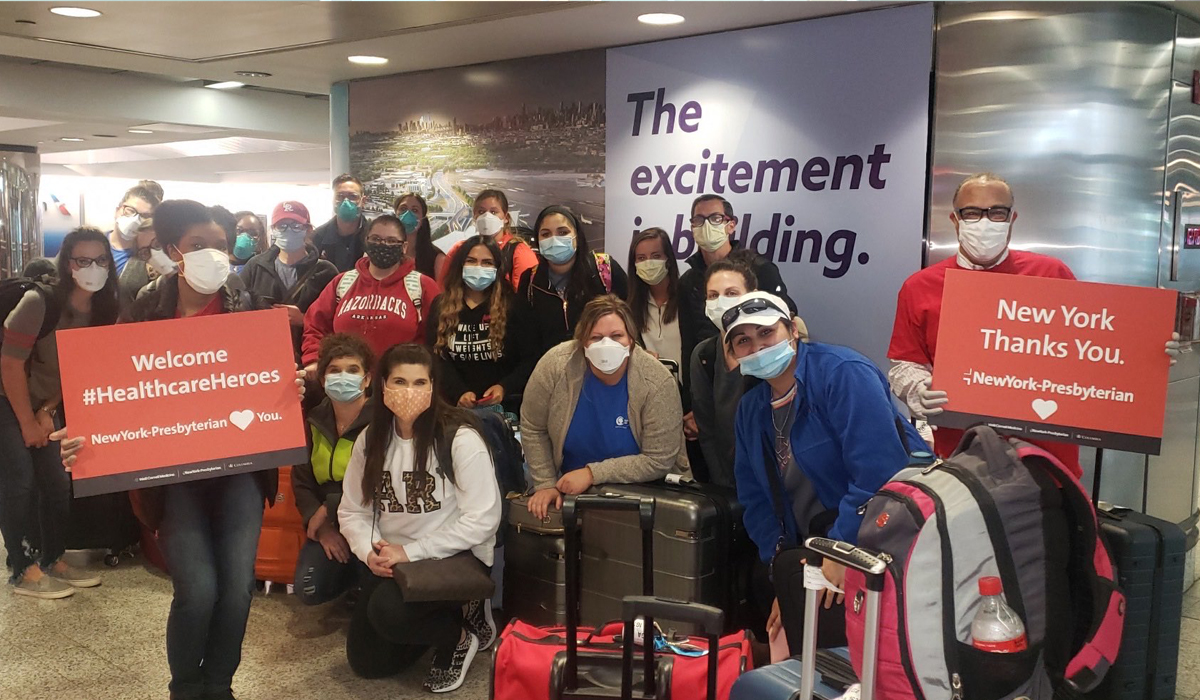
Nurses and respiratory therapists from UAMS and Arkansas Children’s Hospital are welcomed by NewYork-Presbyterian.
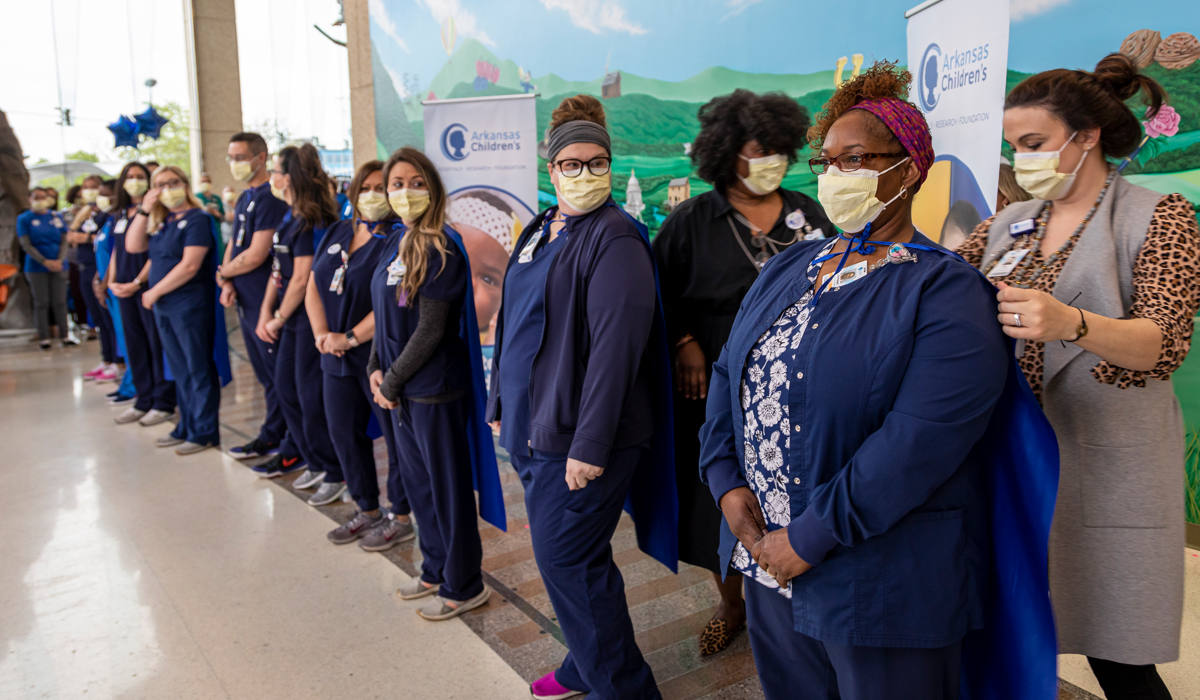
Arkansas Children’s Hospital sent nine nurses and five respiratory therapists. Before their departure, each one received a superhero cape.
New York State has more coronavirus cases than any country in the world, and New York City is the center of that outbreak and the hardest-hit city in the global crisis, with more than 170,500 confirmed COVID-19 cases and more than 18,900 deaths and probable deaths, as of May 4, according to the New York City health department. In response, medical teams from around the country have poured into the area to help local hospitals expand their capacity.
The Cayuga Health team was among those that stepped up.
More than 50 doctors, nurses, and other healthcare professionals from Cayuga Health in Ithaca joined their Weill Cornell Medicine and NewYork-Presbyterian/Weill Cornell Medical Center counterparts to care for New Yorkers diagnosed with COVID-19.
The team from Cayuga Health, which operates Cayuga Medical Center, the largest medical center serving Cornell University’s Ithaca campus, arrived April 8 for one month. Tompkins County, which includes Ithaca, has so far been spared the brunt of the COVID-19 outbreak, and with outpatient and elective appointments canceled, the center’s medical team was available to redeploy where the need was greatest.
“Every night our medical staff was going home and watching the news and seeing what was happening in New York City and realizing that others were in need — whereas in Ithaca, thankfully, the burden from the pandemic has been much lighter,” says Dr. Martin Stallone, Cayuga Health’s CEO, who’s also a clinical instructor in medicine at Weill Cornell Medicine.
“Brought Us Closer”
As nurses who are engaged to be married and have intensive care unit experience, Charity Martin and Richard Milam decided to go together when UAMS, whose chancellor, Dr. Cam Patterson, is a former senior executive at NewYork-Presbyterian, asked for volunteers.
“I call this our pre-honeymoon,” says Richard, noting that their European honeymoon was canceled because of the pandemic. “This really was a good example of her showing me, ‘I’ll be with you through sickness or health.’”
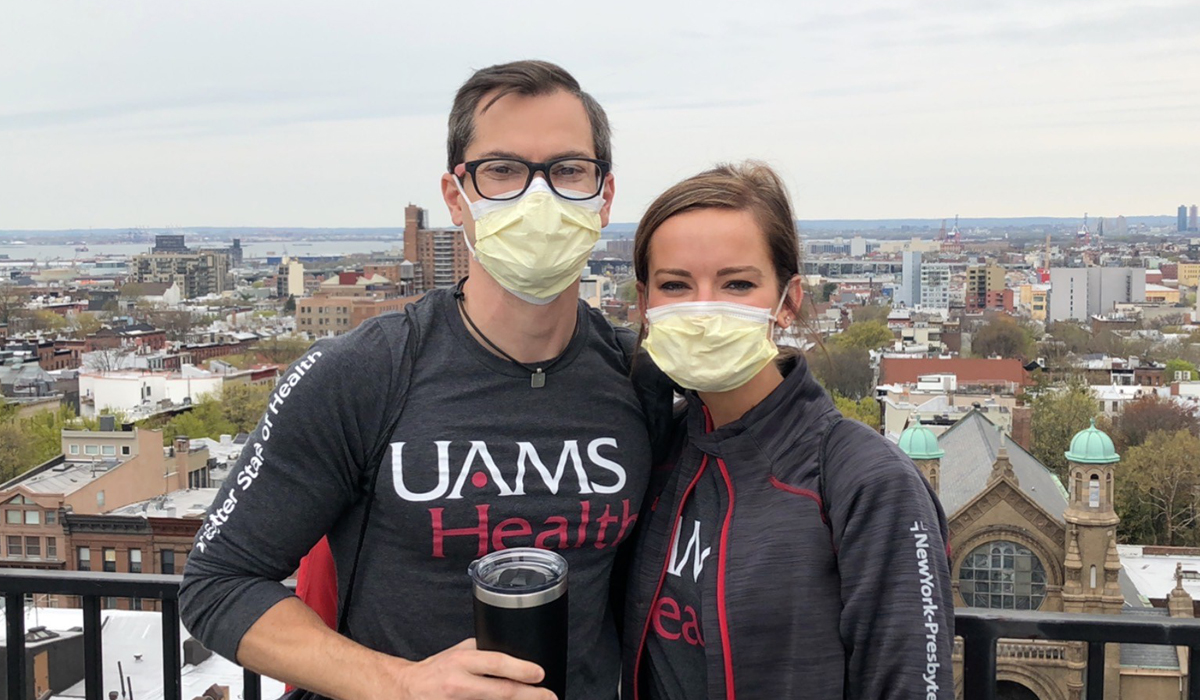
Nurses Richard Milam and Charity Martin from UAMS on the roof of NewYork-Presbyterian Brooklyn Methodist Hospital, where they worked in intensive care units.
Charity, 25, and Richard, 36, who work at a trauma center in Little Rock, Arkansas, cared for patients in adjoining ICU units at NewYork-Presbyterian Brooklyn Methodist Hospital. They would schedule their lunches together, where they’d take off their masks, “breathe some fresh air,” hold hands, and eat lunch.
Exhausted after their 12-hour shift, they’d go back to their hotel room to have dinner and watch TV. On one day off, they took the Staten Island ferry to see the Statue of Liberty.
The couple felt driven to help relieve some of the strain on the hospital’s healthcare workers.
“The fact that they’ve been doing this for two months now, shift after shift, and that they’re handling it with such grace and a good sense of humor and are so upbeat and positive, is just truly inspiring,” Richard says.
Charity and Richard recently returned home early to Little Rock so they can finish their quarantine, in hopes of keeping their May 24 wedding date, “even if it’s in our backyard” with just a few people to avoid a large gathering, Charity says.
The experience of caring for so many critical patients has strengthened their bond, the couple says.
“I got to bring my support system with me,” Richard says. “The person that I want to talk about my rough day or to go to for comfort came with me. It brought us closer.”
“It almost felt wrong to have this skill set and not be using it in a place where it was needed during a pandemic.”— Dr. Tomas Diaz
Providing Relief
When Dr. Diaz from UCSF heard that his hospital was sending a team to NewYork-Presbyterian, he felt compelled to go.
“It almost felt wrong to have this skill set and not be using it in a place where it was needed during a pandemic,” he says.
Dr. Diaz has been working in the emergency departments at NewYork-Presbyterian/Weill Cornell Medical Center and NewYork-Presbyterian Lower Manhattan Hospital, treating COVID-19 patients as well as everything else at the ED, including strokes, stabbings, and appendicitis.
“It feels good to just lighten the load of these physicians,” says Dr. Diaz, 32, a medical education fellow in the emergency medicine department at his San Francisco hospital.
His family was hoping to visit him, but Dr. Diaz nixed their plans because he didn’t want to potentially expose them. His parents and grandmother insisted, though, on driving in from New Jersey one day and stayed in the car outside Dr. Diaz’s hotel, chatting with him through the rolled-down window. They brought with them “my favorite Cuban meals ready to be reheated” that his mother and grandmother had cooked and a special treat of Materva, a Cuban soda. “I used to love that growing up,” Dr. Diaz says.
His experience working on the front lines at NewYork-Presbyterian during the pandemic is “important for my education,” Dr. Diaz says, “and to take back with me to California for the betterment of the community there as well.”

